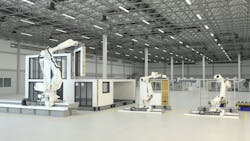ABB Robotics and Porsche Consulting Plan to Transform Housing Manufacturing
It’s no secret that the U.S. and many other countries face a critical housing shortage. One of the fastest ways to address this issue is via manufactured, modular housing—which requires a significant amount of automation technology. According to the Global Construction 2030 Report, automation use in the construction manufacturing sector is forecast to rise by 85% by 2030 driven by demand increases for new and better housing and rising labor shortages.
Construction-related occupations typically dominate the list of labor shortages, according to a recent EURES report, a contributing factor to the shortage of housing in many countries. In the United States, Freddie Mac notes that labor shortages are contributing to a housing shortfall of nearly four million homes, while Deutsche Bank predicts that Germany will experience housing supply shortages in 35 of its cities by 2030.
In light of this reality, ABB Robotics and Porsche Consulting have announced a collaboration to drive automation in the construction industry with a pilot project to develop new practices in modular housing manufacturing. The companies say this collaboration will help meet the need for more affordable and sustainable buildings and reduce the environmental impact of construction.
The traditional construction sector is struggling to meet the demand for new homes, while the environmental performance and efficiency of buildings needs to improve, along with the adoption of more sustainable construction methods. These include reducing the transportation of raw materials to construction sites and eliminating the corresponding costs and impact of removing unwanted materials and waste. This is estimated to account for up to 25% of the material transported to a building site.
ABB Robotics and Porsche Consulting contend that modular construction will yield efficiencies through the reduction in material waste and the number of days lost to adverse weather conditions. Factories also provide a safer and more hospitable working environment, as construction workers account for around 30% of workplace injuries and are four times more likely to be involved in a fatal accident versus other sectors.
“We think there is a clear opportunity to transform this sector and the way homes are built by automating the process of manufacturing modular components,” said Marc Segura, president of the ABB Robotics Division. “Greater, more intelligent automation is the answer to widespread labor shortages and this collaboration will boost productivity, allow greater customization and enable more sustainable and efficient construction practices.”
Construction lags behind other industries in adoption of automation and robotics. In a global survey commissioned by ABB of 1,900 large and small construction businesses in Europe, the U.S. and China, only 55% of construction companies say they use robots, compared with 84% in automotive and 79% in general manufacturing. The survey also shows 81% of construction businesses plan to introduce or increase the use of robotics and automation in the next decade.
“We will bring our [automation] blueprint to demonstrate how robotic modular construction can help support the changes our society is demanding. The joint approach will take modular construction to a new level in terms of quality, efficiency, design and sustainability,” said Segura.

